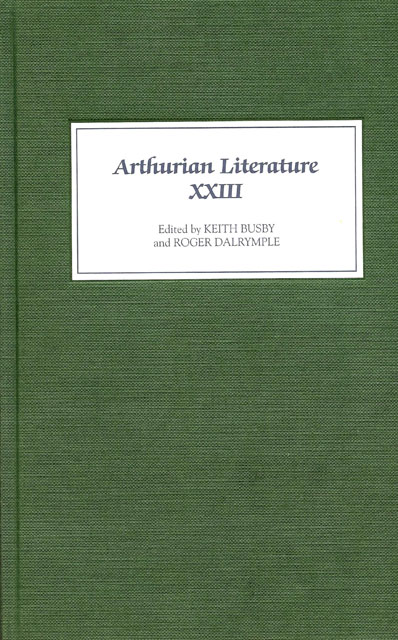Book contents
- Frontmatter
- Contents
- General Editor’s Foreword
- I Beyond Shame: Chivalric Cowardice and Arthurian Narrative
- II Malory’s Forty Knights
- III Fooling with Language: Sir Dinadan in Malory’s Morte Darthur
- IV William Caxton, Wynkyn de Worde and the Editing of Malory’s Morte Darthur
- V Ballad and Popular Romance in the Percy Folio
- VI Local Hero: Gawain and the Politics of Arthurianism
- VII Promise-postponement Device in The Awntyrs Off Arthure: a Possible Narrative Model
- VIII L’Atre perilleux and the Erasure of Identity
- IX The Theme of the Handsome Coward in the Post-Vulgate Queste del Saint Graal
- X A Time of Gifts? Jean de Nesle, William A. Nitze and The Perlesvaus
- XI Thomas Love Peacock’s The Misfortunes of Elphin and the Romantic Arthur
- Contents of Previous Volumes
I - Beyond Shame: Chivalric Cowardice and Arthurian Narrative
Published online by Cambridge University Press: 23 March 2023
- Frontmatter
- Contents
- General Editor’s Foreword
- I Beyond Shame: Chivalric Cowardice and Arthurian Narrative
- II Malory’s Forty Knights
- III Fooling with Language: Sir Dinadan in Malory’s Morte Darthur
- IV William Caxton, Wynkyn de Worde and the Editing of Malory’s Morte Darthur
- V Ballad and Popular Romance in the Percy Folio
- VI Local Hero: Gawain and the Politics of Arthurianism
- VII Promise-postponement Device in The Awntyrs Off Arthure: a Possible Narrative Model
- VIII L’Atre perilleux and the Erasure of Identity
- IX The Theme of the Handsome Coward in the Post-Vulgate Queste del Saint Graal
- X A Time of Gifts? Jean de Nesle, William A. Nitze and The Perlesvaus
- XI Thomas Love Peacock’s The Misfortunes of Elphin and the Romantic Arthur
- Contents of Previous Volumes
Summary
In medieval chivalric narratives, where the central matière is usually armed combat, the issue of actual or potential cowardice often arises. Although it has been suggested, mainly with reference to Froissart's Chronicles, that fear is ‘the one thing chivalric literature virtually never mentions directly’, it is quite frequently found in chansons de geste and romances, where there is less need to safeguard the reputation of actual people, and a generally greater narrative freedom exists. I wish to suggest in this essay that the articulation of cowardice, and hence of courage, in some well-known Arthurian works is more complex, more pragmatically inflected, and more morally developed than the traditional discourse of masculine shame and honour can properly account for. The tendency of chivalric literature to regard courage as a purely spontaneous function of the noble knightly body is countered by the revelation, when one looks further, of incompatible variety in the various systems that seem to underpin its narrative representation. For apart from involvement with discourses of knightly honour, masculinity and the body, courage in chivalric literature often has affinities with the virtues tradition of classical and Christian philosophers from the Greeks to Aquinas, and with practical military commentaries from Vegetius to the present day. The varied aspects of courage in these authorities provide suggestive contexts for literary interpretation. In this select study, after first looking at chanson de geste examples, I refer briefly to Chrétien de Troyes’ Perceval and its Third Continuation, and to Perlesvaus, then in more detail to the later English texts Sir Gawain and the Green Knight and Malory's Le Morte Darthur.
It is not surprising that modern reference to chivalric cowardice occurs mainly in studies of medieval ruling-class masculinity. In the discourse of medieval military honour, a conviction of cowardice is an unanswerable last word because it is such a gross betrayal of the combined expectations of rank and gender, so incompatible with the demands of knighthood and manhood. In French, Anglo-Norman and English heroic tradition, ‘courage and enthusiasm for military action’ are mandatory for all, however much men might be allowed to differ in other ways. Oliver is wiser than Roland, yet as Simon Gaunt says, ‘in action the two are indistinguishable’.
- Type
- Chapter
- Information
- Arthurian Literature XXIII , pp. 1 - 17Publisher: Boydell & BrewerPrint publication year: 2006



